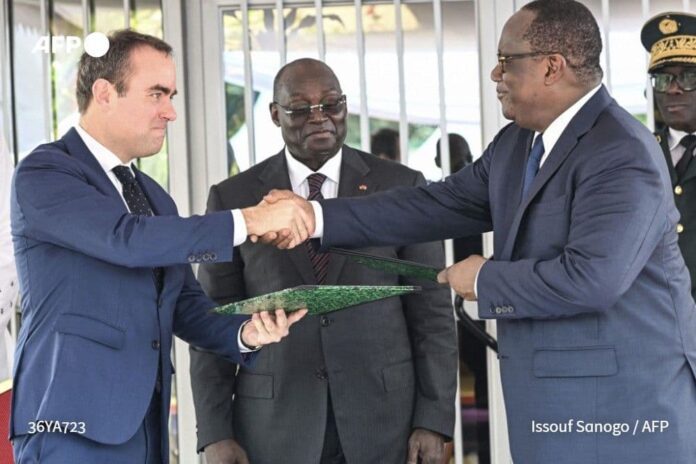France has officially relinquished control of its sole remaining military base in Ivory Coast, ending a decades-long chapter of direct military presence in the West African nation. The handover ceremony, held at the Port-Bouët base near Abidjan, saw the Ivorian flag hoisted in place of the French tricolor as defense ministers from both countries formalized the transfer with a signed agreement. The move marks a significant pivot in France’s military strategy in the Sahel and West Africa, though officials emphasized that it does not signal a full withdrawal from the region.
French Armed Forces Minister Sébastien Lecornu, who attended the ceremony alongside his Ivorian counterpart, Téné Birahima Ouattara, described the transfer as a transformation rather than an exit. “France is transforming its presence, France is not disappearing,” Lecornu stated, highlighting a shift toward a lighter, advisory role. Under the new arrangement, approximately 80 French servicemen will remain in Ivory Coast to advise and train the Ivorian armed forces, while the bulk of the contingent—previously numbering around 1,000 troops—will withdraw progressively throughout 2025.

The Port-Bouët base, strategically located near Abidjan’s international airport, has been a key hub for France’s military operations in West Africa since the end of colonial rule in 1960. For years, it served as a staging point for French forces supporting regional efforts to combat the growing threat of jihadist insurgencies across the Sahel, a semi-arid region stretching from Senegal to Sudan. In recent times, these troops played a vital role in assisting Ivory Coast and its neighbors, including Mali, Burkina Faso, and Niger, to counter attacks from groups linked to Al-Qaeda and the Islamic State. The broader region has seen a surge in violence, with jihadist factions exploiting porous borders and political instability to expand their influence.
The handover comes amid evolving dynamics in France’s relationship with its former colonies. Over the past decade, France has faced increasing scrutiny and occasional resentment over its military footprint in Africa, prompting a reevaluation of its approach. The closure of the Port-Bouët base follows a pattern of downsizing permanent deployments, such as the withdrawal of troops from Mali in 2022 after tensions with the country’s junta, and a reduction of forces in Senegal and Chad. In Ivory Coast, however, both nations were keen to stress the enduring strength of their partnership.

During the ceremony, new military cooperation agreements were signed, reaffirming commitments to joint training, intelligence sharing, and counterterrorism efforts. Ivorian Defense Minister Ouattara hailed the transition as a step toward greater sovereignty while maintaining “warm and fraternal” ties with France. “This is not an end, but a new beginning,” he said, noting that the Ivorian military would benefit from continued French expertise as it builds its capacity to address security challenges independently.
The transfer also reflects broader geopolitical shifts. Ivory Coast, a regional economic powerhouse, has maintained relative stability compared to its Sahel neighbors, despite occasional spillover threats from jihadist groups operating in northern border areas like the Comoé National Park. Analysts suggest that France’s scaled-back presence could encourage Ivory Coast to deepen security ties with other partners, such as the United States, which has increased its military assistance in West Africa, or regional blocs like the Economic Community of West African States (ECOWAS).

For France, the handover aligns with President Emmanuel Macron’s pledge to modernize France’s engagement with Africa, moving away from a colonial-era model of permanent bases toward a more flexible, cooperative framework. However, the gradual withdrawal of troops from Ivory Coast raises questions about France’s ability to respond swiftly to crises in a region where instability remains a pressing concern.
As the last French soldiers prepare to depart Port-Bouët over the coming months, the base’s closure symbolizes both an end and a recalibration of France’s military legacy in Ivory Coast—a nation where its influence, while diminished, is far from extinguished.







